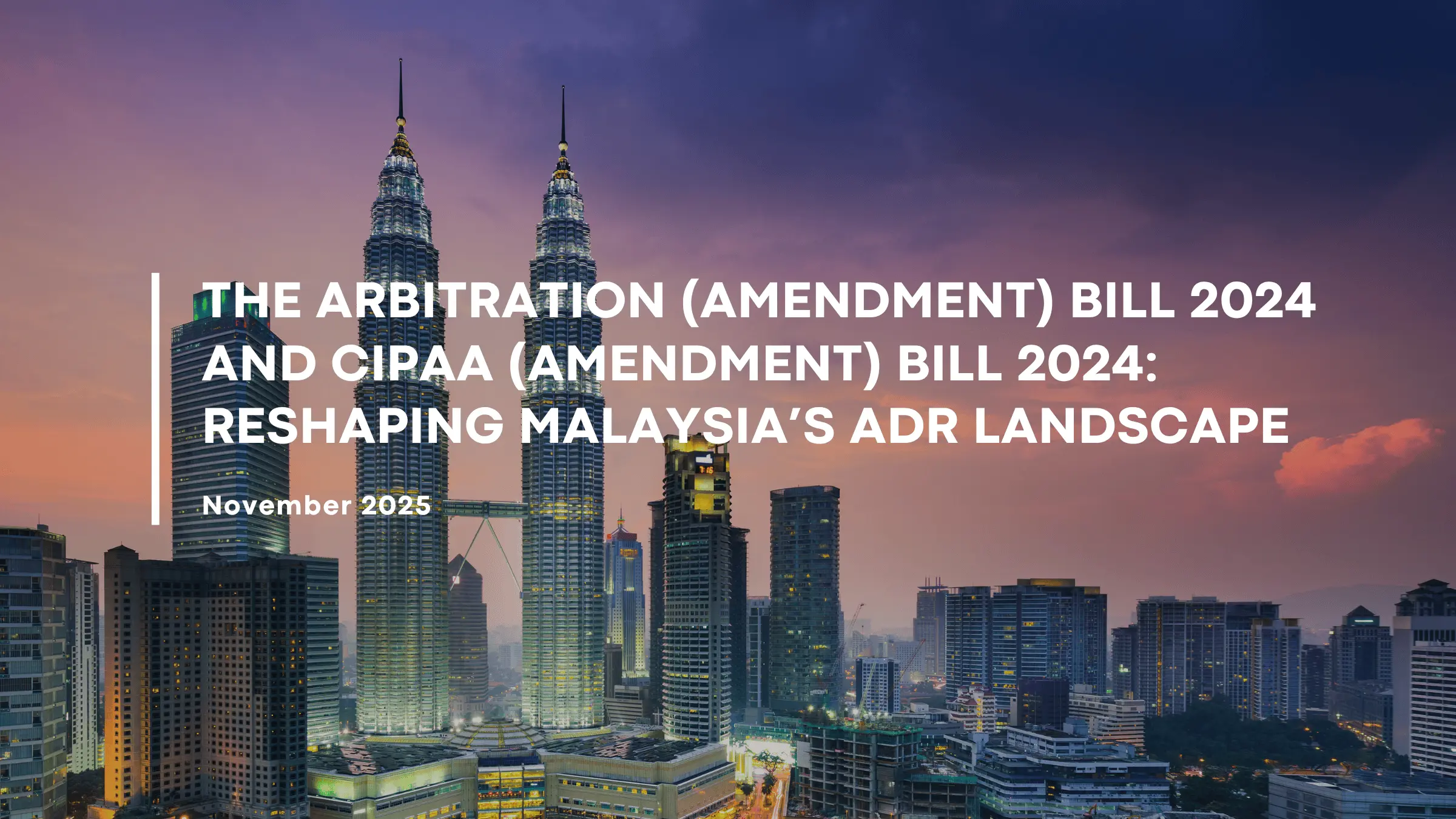As we move towards the day that the Arbitration (Amendment) Act 2024 (“Arbitration Bill”) and the Construction Industry Payment and Adjudication (Amendment) Act 2024 (“CIPAA Bill”) will come into force, this begs the question as to how the change of landscape in the alternative dispute resolution would affect the country.
The Arbitration Bill 2024 and the CIPAA Bill were passed by the Dewan Rakyat and Dewan Negara on 16 July 2024 and 24 July 2024, respectively. On 1 November 2024, the Arbitration Bill was gazetted. The Arbitration Bill amends the Arbitration Act 2005 (“AA 2005”), while the CIPAA Bill amends the Construction Industry Payment and Adjudication Act 2012 (“CIPAA 2012”).
Part I – The Arbitration (Amendment) Bill 2024
An overview of the Arbitration Bill proposes the following key concepts and amendments:
- The introduction of the role “President of the AIAC Court of Arbitration”
- Form of arbitration agreement
- Third party funding
- Recognition and enforcement of an award
- Applicable law to arbitration agreement
- Appointment of arbitrators / multiple parties & institutional structure
- Digital and electronic signatures on awards
A. The Introduction of the role “President of the AIAC Court of Arbitration”
Section 2 of the Arbitration Bill defines “President” as the President of the Asian International Arbitration Centre Court of Arbitration.
The term President would replace the term Director and Removal of Director references.
It also ensures that all acts or appointments made by the former Director remains valid under the new structure.
B. Form of arbitration agreement
Section 9(4)(b) of the AA 2005 is amended to insert the words “or any other documents” after “statement of claim and statement of defence”. This means that the statutory definition of what constitutes a “writing” for an arbitration agreement is broadened. In practice, this gives parties more flexibility in how an arbitration agreement can be constituted.
C. Third-party funding
A new Chapter 2 (Part III) is inserted (Sections 46A–46I of AA 2005) to regulate third-party funding (“TPF”) for arbitrations. It introduces to enhanced provisions on TPF, allowing all or part of the costs of an arbitration to be financed by an external funder.
Key provisions in this chapter include:
- Definition of “third-party funder”, “funded party”, “third party funding”, “third‐party funding agreement”.
- The rule of common law against maintenance and champerty shall cease to apply in relation to the third-party funding and a third-party funding agreement shall not be treated as contrary to public policy on the grounds of maintenance and champerty.
- The Minister may issue a “code of practice” for third-party funding, setting out the practices and standards relating to the third-party funding in which third party funders are ordinarily expected to comply. The code of practice may provide:
- the requirements on promotion of the third-party funding;
- the requirements for a third party funding agreement including the degree of control that a third-party funder will have in relation to an arbitration, liability of a funded party and termination of a third party funding agreement;
- the criteria on a third-party funder including the sufficient minimum amount of capital which shall be satisfied by third party funder;
- procedures for addressing potential, actual or perceived conflicts of interest by a third-party funder; and
- the procedures for enhancing the protection of funded party.
- Any non-compliance with any of the provision of the code of practice issued under section 46D of AA 2005 shall not, in itself, render a third-party funder liable to any action or legal proceedings. However, any compliance or non-compliance with any of the provisions of the code of practice may be taken into account by any arbitral tribunal or court if such compliance or non-compliance is relevant to a question being decided by the arbitral tribunal or court.
- Confidentiality Obligations: Section 46F of AA 2005 allows limited disclosure to secure funding, while imposing strict confidentiality rules.
- Disclosure obligations: the existence of a third-party funding arrangement must be disclosed to the arbitral tribunal or the court either at the commencement of proceedings or within 15 days of entering into the funding agreement.
D. Recognition & enforcement of an award
Section 38(1) of AA 2005 is amended as follows, “an award made in respect of an arbitration where the seat is in Malaysia or an award from a foreign State shall be recognised as binding and, upon application to the High Court, shall be enforced subject to Section 39.”
This brings the provision more in line with the UNCITRAL Model Law on International Commercial Arbitration, improving certainty for recognition and enforcement. With this amendment, the award made in respect of the arbitration shall be recognised as binding at the first instance without requiring an application to be made to the High Court for its recognition.
E. Applicable law to arbitration agreement
A new section 9A of AA 2005 is introduced. This amendment clarifies a longstanding ambiguity on which law applies to an arbitration clause (especially in international cases).
Under the new Arbitration Bill, parties are free to agree on the law applicable to the arbitration agreement. Under section 9A(2) of the AA 2005, if they fail to agree, the law applicable to the arbitration agreement defaults to the law of the seat of arbitration.
The agreement by the parties on the law applicable to an agreement of which the arbitration agreement forms a part of does not, by itself, amount to an express agreement that the same law governs the arbitration agreement.
F. Appointment of arbitrators / multiple parties & institutional structure
Section 13 of AA 2005 is amended as follows:
- A new subsection (3A) provides that where there are multiple claimants or multiple respondents, all the claimants shall jointly appoint one arbitrator and all the respondents jointly appoint one arbitrator.
- Under subsection (4), (5), (6), (7), (8) and (9), the term “Director of the Asian International Arbitration Centre (Malaysia) (AIAC)” is replaced by “President”.
This effectively aligns with the restructuring of AIAC and its Court of Arbitration, intended to strengthen institutional arbitration in Malaysia
G. Digital and electronic signatures on awards
Section 33 of AA 2005 is amended so that “signatures” of arbitrators on awards can include digital signatures and electronic signatures (as defined in the respective acts: Digital Signature Act 1997 & Electronic Commerce Act 2006).
This modernises the framework to reflect electronic transactions and remote arbitration practices.
Part II – Construction Industry Payment and Adjudication (Amendment) Bill 2024
The CIPAA Bill aims to be in line with the restructuring and institutional reforms initiated by the AIAC under the Supplementary Agreement executed between the Government of Malaysia and the AsianAfrican Legal Consultative Organization (AALCO) relating to the Asian International Arbitration Centre (Malaysia) (AIAC) on 20 February 2024 as follows:
- The introduction of the role of the President, mirroring the position created under the Arbitration Bill;
- The deletion of the definition of “KLRCA” (the former name of the AIAC) and the replacement of that term with “AIAC” throughout the CIPAA 2012;
- The replacement of the term “Director of KLRCA” with “AIAC” in various provisions;
- The substitution of the role of the “Director of KLRCA” with the “President” throughout the Act; and
- The insertion of a saving provision to preserve all appointments made by the Director of KLRCA prior to the coming into force of the CIPAA Bill, which shall remain valid and effective until revoked by the President.
Conclusion
The Arbitration Bill 2024 represents a substantial reform in Malaysia’s ADR ecosystem. It modernises arbitration governance, introduces third party funding, and strengthens Malaysia’s global competitiveness as an arbitration hub.
In contrast, the CIPAA Bill serves as a transitional measure, aligning statutory references with AIAC’s restructuring but stopping short of substantive reform.
© TSL Legal
This article is intended to provide general information only and does not constitute legal advice. It should not be used as a substitute for professional legal consultation. We recommend seeking legal advice before making any decisions based on the information available in this article. TSL Legal fully disclaims responsibility for any loss or damage which may result from relying on this article.
Further information
Should you have any questions on the implications of this Act or how this development may affect you or your business, please get in touch with:

